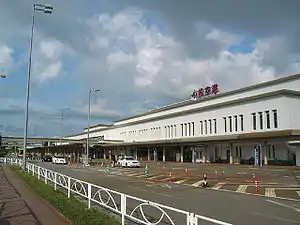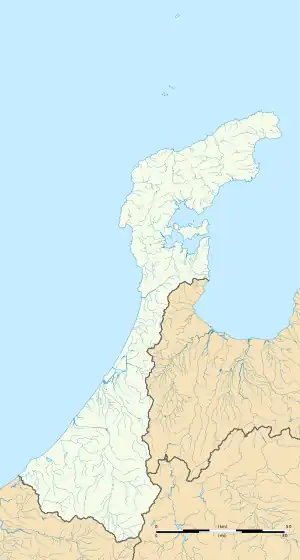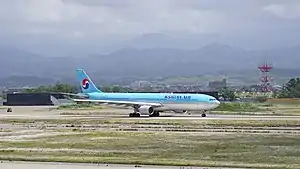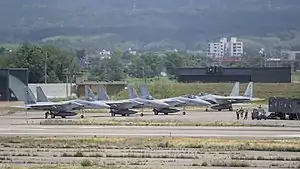Komatsu Airport
Komatsu Airport (小松飛行場, Komatsu Hikōjō) (IATA: KMQ, ICAO: RJNK) is an international airport located 4.2 km (2.6 mi) west southwest of Komatsu Station[2] in the city of Komatsu, Ishikawa Prefecture, Japan. It is the largest airport in the Hokuriku region and serves the southern portion of Ishikawa Prefecture including the capital of Kanazawa (which has its IATA city code QKW), as well as Fukui and the northern portion of Fukui Prefecture.
Komatsu Airbase 小松飛行場 Komatsu Airport | |||||||||||
|---|---|---|---|---|---|---|---|---|---|---|---|
 | |||||||||||
| Summary | |||||||||||
| Airport type | Military/Public | ||||||||||
| Operator | Ishikawa Prefecture / JASDF | ||||||||||
| Serves | Ishikawa Prefecture and Northern Fukui Prefecture | ||||||||||
| Location | Komatsu, Ishikawa, Japan | ||||||||||
| Elevation AMSL | 22 ft / 7 m | ||||||||||
| Coordinates | 36°23′38″N 136°24′27″E | ||||||||||
| Website | Komatsu Airport | ||||||||||
| Map | |||||||||||
 RJNK Location in Ishikawa Prefecture  RJNK Location in Japan | |||||||||||
| Runways | |||||||||||
| |||||||||||
| Statistics (2015) | |||||||||||
| |||||||||||
Source: Japanese Ministry of Land, Infrastructure, Transport and Tourism[1] | |||||||||||
The Japan Air Self-Defense Force Komatsu Base (小松基地 Komatsu Kichi) shares the runway with civil aviation; the inland-side taxiway is used by the JASDF and the sea-side one is used by civilian flights. The base hosts a Kōkū-sai (Air Festival) every September, featuring demo flights by fighter and rescue aircraft as well as the Blue Impulse acrobat flight team. It often hosts technical competitions of the JASDF. The "Airspace G" is a large training airspace over the Sea of Japan to the north of the base.
The airport has a single passenger terminal building serving domestic and international flights. Its international cargo terminal, known as HIACT (Hokuriku International Air Cargo Terminal), is owned by a consortium of government and corporate entities and aims to serve as an international distribution center for cargo from Europe and other continents.[3] Its runway surface has been upgraded to enable non-stop freighter flights to and from Europe and North America in late 2006.
History


The airport was originally a base of the Imperial Japanese Navy during World War II. Construction of the first 1,500 m (4,921 ft) east-west and 1,700 m (5,577 ft) north–south runways was completed in 1944. The United States Armed Forces took over the base at the end of the war in 1945 and used the site as a radar facility. The airport saw irregular service to Osaka and Nagoya starting in 1955.[4]
The base was handed over to the Japan Air Self-Defense Force in 1958 and designated as a jet fighter base in 1960. Komatsu Base was formally inaugurated in 1961. Scheduled service to Osaka and Nagoya began in 1962, using Douglas DC-3 aircraft, followed by Fokker F.27 service to Tokyo in 1963. The airport's first international service was a charter flight from Hong Kong in 1973.[4]
Ishikawa Prefecture set aside funds for an airport promotion committee in 2012 amid expectations that the opening of the Hokuriku Shinkansen in 2015 would impact traffic on the Komatsu-Tokyo route.[5]
- 1960 The runway was extended to 2,400 m (7,874 ft). Designated as a shared airport for defense and civil.
- 1964 The runway was extended to 2,700 m (8,858 ft) to introduce F-104J.
- 1973 Jet service began with Boeing 737s.
- 1979 International scheduled service to Seoul began.
- 1980 B747s were introduced to Komatsu Airport, for flights to Tokyo
- 1981 The new domestic terminal complete.
- 1984 The new international terminal complete.
- 1994 HIACT (International Cargo Building) complete. Designated as a Free Access Zone.
- 1994 Cargolux began international scheduled freight service between Luxembourg.
- 2002 The new HIACT terminal complete.
- 2004 The new control tower began operations.
- 2005 The temporary runway began operation.
- 2006 Upgrading of the permanent runway complete. Operations switched to the permanent runway.
- 2007 USAF F-15C, C-17 came for JASDF joint training.
- 2007 A new domestic cargo building opens.
Statistics
| Year | Total passengers[6] |
|---|---|
| 2000 | 2,587,941 |
| 2001 | 2,590,333 |
| 2002 | 2,645,038 |
| 2003 | 2,599,706 |
| 2004 | 2,495,837 |
Airlines and destinations
Passenger
Cargo
| Airlines | Destinations |
|---|---|
| Cargolux | Chicago, Hong Kong, Luxembourg, Seoul–Incheon |
JASDF units
Komatsu is the only fighter base on the Sea of Japan coast. The following JASDF units are stationed at Komatsu:[9]
- 6th Air Wing (第6航空団)
- Tactical Fighter Training Group
- Central Air Civil Engineering Group, 2nd Squadron (中部航空施設隊第2作業隊)
- Komatsu Air Rescue Squadron (小松救難隊) – UH-60J and U-125A aircraft
- Komatsu Air Traffic Control Squadron (小松管制隊)
- Komatsu Weather Squadron (小松気象隊)
- Komatsu Regional Air Police Squadron (小松地方警務隊) – responsible for criminal investigations of JASDF personnel in Ishikawa Prefecture, Toyama Prefecture and Fukui Prefecture
Other facilities
- Komatsu Airport Office, Ōsaka Air Transportation Bureau.
- Komatsu Office, Air Transportation Security Association.
- Fire and Disaster Mitigation Office, Ishikawa Prefectural Government.
- Equipped with Bell 412EP fire and disaster mitigation helicopter "Hakusan".
- Komatsu Operations Office, Nakanihon Air Service
- A helicopter is based here.
Access
The airport is located near the Hokuriku Expressway. Scheduled bus service is available to Kanazawa Station (40 minutes), Komatsu Station (15 minutes) and Fukui Station (1 hour).[10]
References
- "Komatsu Airport" (PDF). Japanese Ministry of Land, Infrastructure, Transport and Tourism. Archived from the original (PDF) on 21 October 2016. Retrieved 7 January 2017.
- AIS Japan
- "Outline of HIACT". Komatsu Airport Association. Archived from the original on 27 February 2014. Retrieved 21 February 2014.
- "History". Komatsu Airport Association. Archived from the original on 27 February 2014. Retrieved 21 February 2014.
- "石川県の2012年度予算案、エネルギー・新幹線に重点". Nihon Keizai Shimbun. 21 February 2012. Retrieved 21 February 2014.
一方、羽田便が中心の小松空港(小松市)は新幹線開業で利用客の大幅減が必至。12年度予算案では「小松空港活性化委員会(仮称)」の設立や羽田空港での乗り継ぎの利用促進のための費用を計上。国際貨物便向けの助成制度も拡充する。
- Data of Komatsu Airport Archived 7 February 2007 at the Wayback Machine
- "EVA Air flight BR 158: Taiwan Taoyuan, Taipei - Komatsu".
- "tigerair Taiwan Adds Kochi / Komatsu Flights in NS23". Aeroroutes. Retrieved 22 May 2023.
- "部隊紹介". JASDF. Archived from the original on 19 September 2017. Retrieved 21 February 2014.
- "連絡バス時刻表". Komatsu Airport Association. Archived from the original on 27 February 2014. Retrieved 21 February 2014.
External links
- Komatsu Airport
- (in Japanese) Hokuriku International AirCargo Terminal
- (in Japanese) JASDF Komatsu Base
- Komatsu Airport Guide from Japan Airlines
- Current weather for RJNK at NOAA/NWS
- Accident history for KMQ at Aviation Safety Network